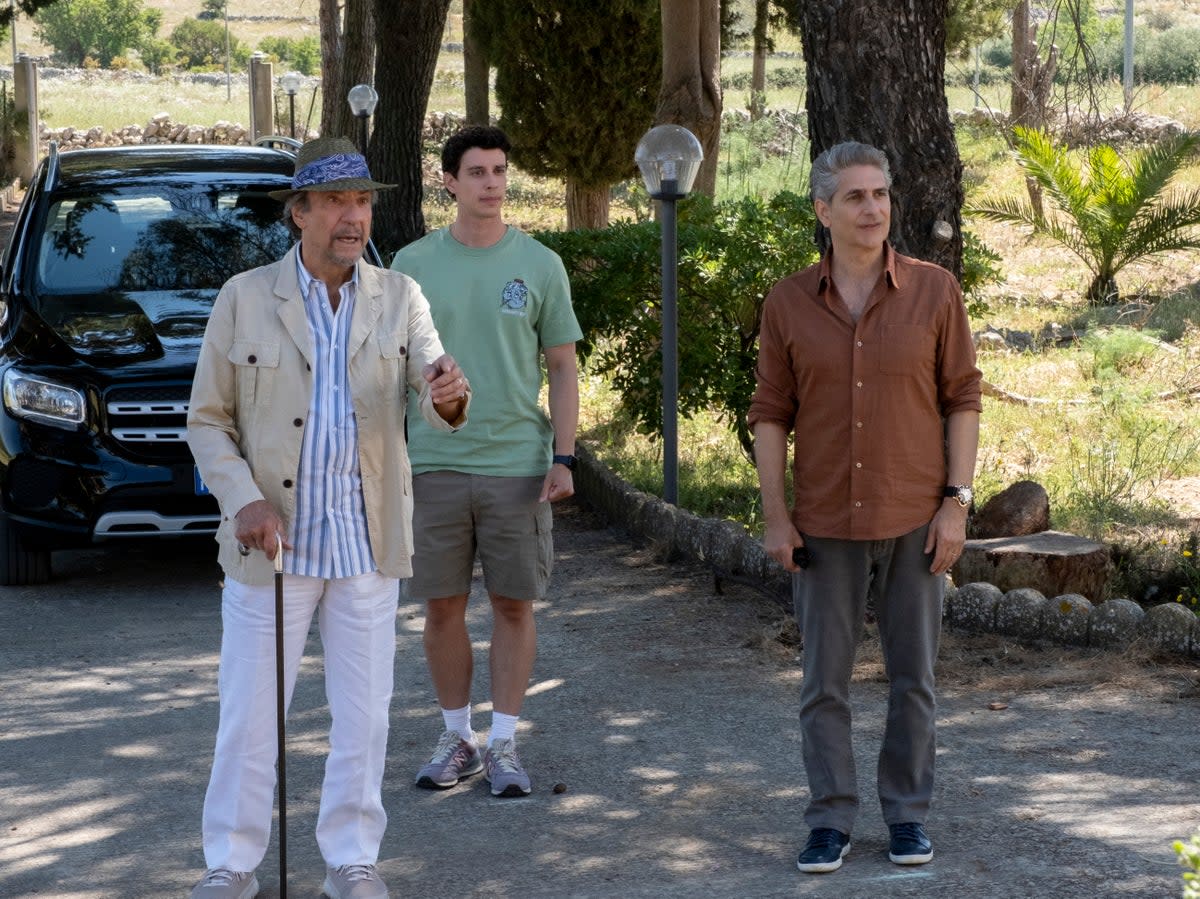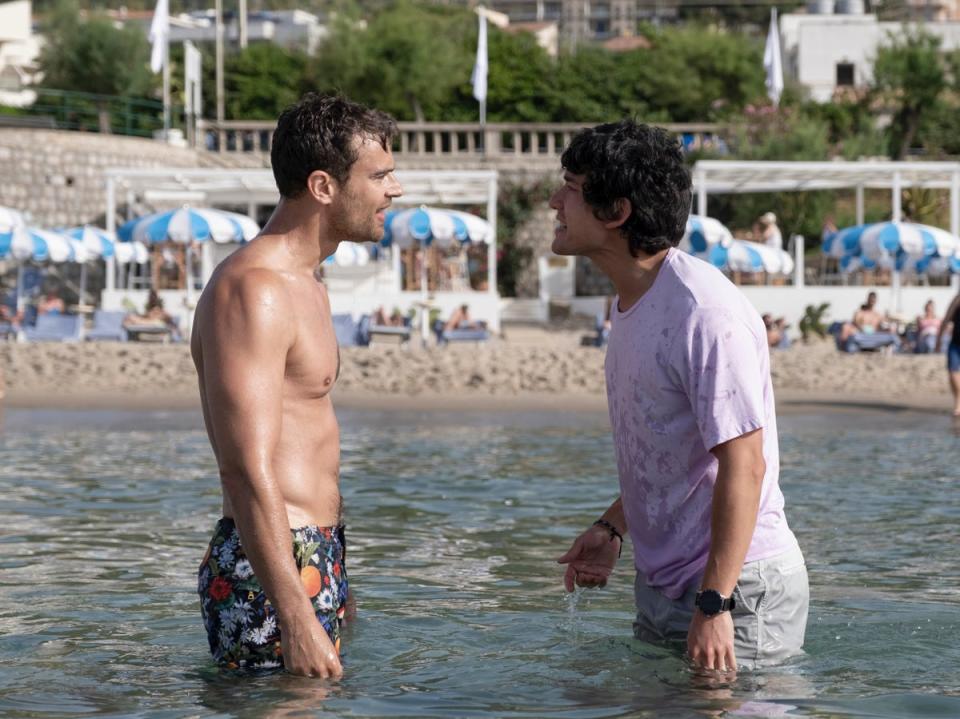The real murderer in White Lotus is masculinity

Is your favourite film The Godfather? Then you’ve probably felt emasculated by modern society. Oh, and you’re probably also wildly out of touch with what’s going on in the world. At least that’s the theory, according to Stanford graduate Albie Di Grasso (played by Adam DiMarco) in the latest series of The White Lotus, Mike White’s hit HBO satire about stupidly wealthy people staying in a luxury hotel.
According to Albie, the cult 1974 film represents “a fantasy about a time when [men] could go out and solve all their problems with violence, sleep with every woman, and then come home to their wife who doesn’t ask them any questions and makes them pasta”. Albie’s grandfather, Bert (F Murray Abraham), calls it a “normal male fantasy”. But Albie counters that “movies like that socialise men into having that fantasy”. His father, Dominic (Michael Imperioli), rolls his eyes but ultimately sides with Bert, who dismisses his grandson as “brainwashed”.
It’s a scene that encapsulates the entire raison d’etre of this series. As with season one, we know someone will meet their maker. But so preoccupied are we with guessing the identity of the killer, it seems no one has spotted the actual guiltiest party on the Sicily resort. The thing slowly murdering our fresh batch of Aperol-guzzling, Gucci-wearing, cocaine-snorting lotus-eaters? Clearly, it’s masculinity.
Every storyline is informed by it in one way or another, whether it’s the conversations the characters are having, or the sex that they’re not. Why is it that every dinner table scene feels so intense? As though no one is ever saying what they really mean? And why does Dominic constantly look like he needs to go to the toilet? As Vanity Fair put it: are the men of White Lotus OK?
The answer is no. Consider the DiGrasso clan, who were supposed to be holidaying with Dominic’s wife and sister-in-law. Alas, he has been caught cheating on his wife again, so she and their daughter both choose to stay home, leaving the three men to bring three generations of bewildered masculinity to the Sicilian shores.
At 80 years old, Bert is unapologetic in his misogyny, clinging on to the sexual codes of a bygone era. He is inappropriate with every woman he encounters, rebukes his son only for being too “sloppy” with his infidelities, and insists he “can still impregnate a woman”. Dominic, meanwhile, is the Gen X-er trying to Be Better – and then drastically failing. He rebukes his father for harassing women, calls his wife to say he still loves her (“leave me alone!” she screams back), and insists he is just another sex addict trying to heal. However, he is also a serial cheater who hired a local sex worker for the week in advance. So perhaps he’s not that different from his father after all, but just in possession of slightly more self-awareness.
Then there’s Albie, the self-described “good guy” who just wants to respect women. But as the season goes on, it becomes clear that he represents another archetype, one closely aligned with Gen Z and millennials. Introducing… the soft boi. Sure, Albie challenges his family and says things like “gender is just a construct” before smirking at his new pal – and crush – Portia (Haley Lu Richardson) like he’s just solved the pay gap. But the way Albie pushes her into hanging out with his family when she clearly doesn’t want to, sleeps with Lucia (the same sex worker hired by his father, by the way) even though he can’t afford to pay her, and laments the fact that women don’t want “nice guys” are blatant red flags. Don’t even get me started on the fact that he describes his type as “pretty, wounded birds”.
Today, masculinity is being examined more than ever before, particularly in popular culture. The subject has been reimagined, softened, detoxified, and completely deconstructed in every way you might imagine. But the question White posits is different; because when you break it all down, how much has really changed?
It’s a subject handled with more subtlety in other characters. Take Cameron (Theo James) and Ethan (Will Sharpe), the affluent college buddies who are vacationing with their respective wives, Daphne (Meghann Fahy) and Harper (Aubrey Plaza). At first, the two men are presented as polar opposites. Cameron is the arrogant tech bro who ignores the news, insists cheating is normal, and instantly points out “hookers” when they arrive in the hotel. He later asks them for drugs and sleeps with one of them.

Ethan, however, is the sanctimonious nerd, who starts every day with an early morning run and prefers watching porn to having sex with his wife because she’s “not a morning person”. As the show goes on, though, their characters start to align, much like the Di Grasso men. OK, Ethan doesn’t sleep with Lucia’s friend, Mia, despite Cameron’s encouragement. But he still kisses her – and lies to Harper about what happened when she finds a condom wrapper in their bathroom.
Later, he becomes suspicious of Harper and Cameron, for no reason in particular other than having seen them laughing together when they had lunch. Soon, Ethan is consumed by an Othello breed of jealousy, accusing his wife of cheating when he still hasn’t come clean about what happened with Mia. Nonetheless, the fragility of the male ego continues to govern his thoughts and feelings – and, in the finale, will undoubtedly result in him and Cameron coming to blows in what could well be a deadly pissing contest.
Then there’s Greg (Jon Gries). Lovely, kind, unassuming Greg, who famously came to Tanya’s rescue (Jennifer Coolidge) in season one. Or so we thought. Somehow, this season he has transformed into a fat-shaming, abusive sleazebag who may or may not be plotting a grand scheme to take all of his wife’s money. Even sex with her has become a favour – and when he says he needs to clean up first because of his “crotch swamp” one can’t help but feel like he’s trolling her.
Don’t get me wrong, the women in The White Lotus are hardly paradigms of virtue, either. Daphne has a personal trainer-slash-lover on the side, Mia sleeps with the hotel pianist just so he’ll advance her career in music, and for all we know, Harper might well have slept with Cameron. But none of these characters are suffering from the same sickness as the men around them: coded masculine traits like pride, entitlement, competitiveness, and alpha sexuality, engrained from centuries of patriarchy. They might just be bad people – and, frankly, given the way they’re treated by the men in their lives, who can blame them for fighting back?
When Daphne talks about her secret lover, she immediately earns Harper’s respect – and likely that of most viewers. “I’m not a victim,” she tells her in a heart-to-heart during an excursion to nearby Noto. Meanwhile, Mia (Beatrice Granno) and Lucia (Simona Tabasco) make it very clear from the beginning that toxic masculinity is something they can exploit through sex work, bringing them closer to their respective goals of being a musician and moving to LA. Again, it’s hard not to admire them for this.
It’s hard to know where White will take us; the creator and writer has a habit of surprising viewers with unexpected heroes and villains in a season finale. Perhaps the Di Grassos will wind up redeemed. Maybe Bert will even find himself a charming Sicilian wife his own age. Or perhaps he’ll scare her off with another unconvincing comment about the male body – “it’s a penis, not a sunset”. Either way, in the face of so much troubled, toxic and actually rather tragic masculinity, it looks like Daphne’s is the take we should take most seriously. In Noto, she tells Harper, “I feel sorry for men, you know”. Perhaps White does too.

 Yahoo Movies
Yahoo Movies 
